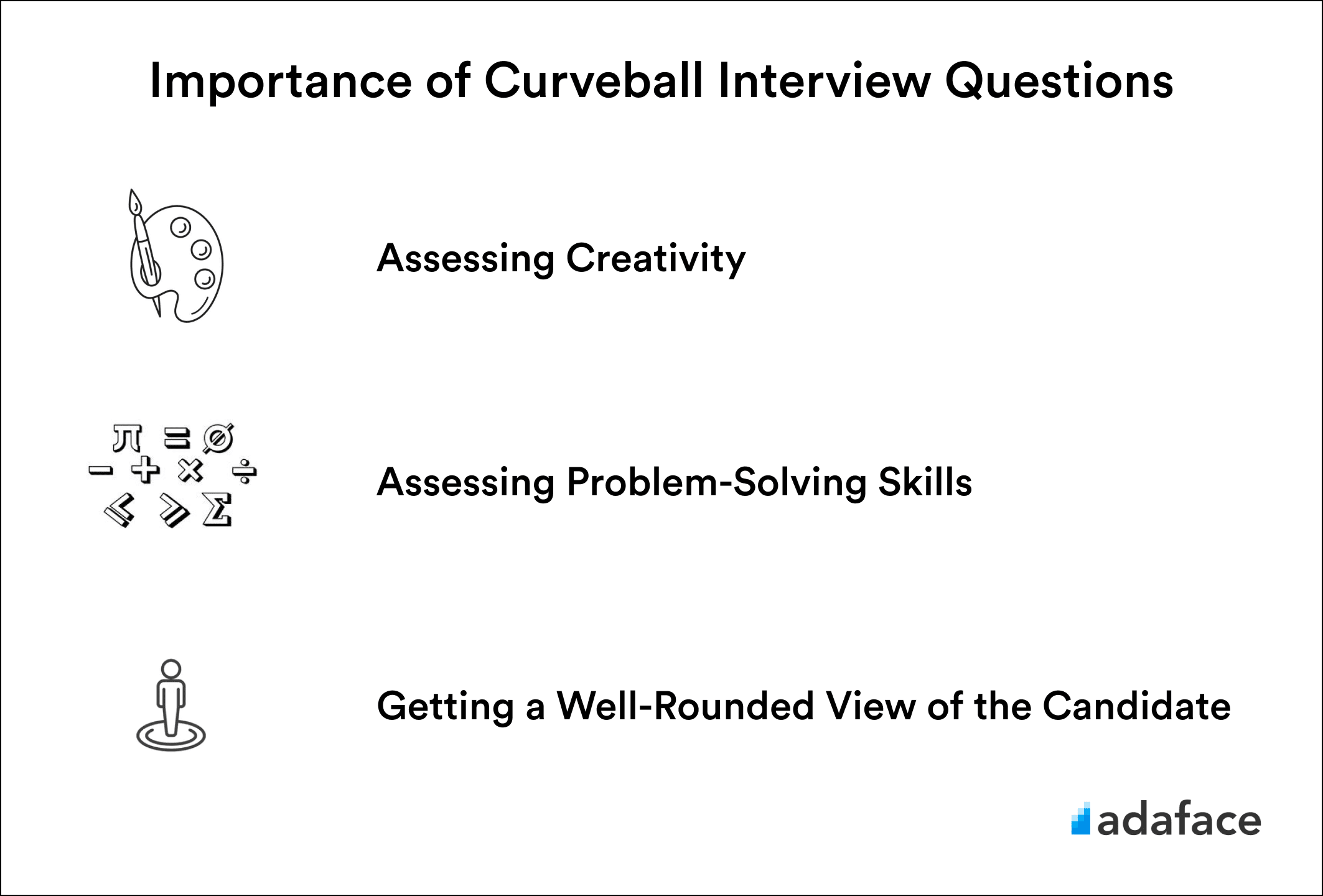Curveball Interview Questions: Tips and Examples for Recruiters
Explore the world of curveball interview questions and get tips for using it to assess a candidate's problem-solving skills and creativity. Learn how to use these offbeat questions effectively in the recruitment process, with examples of what to ask.


Tell me about yourself.
Why are you interested in working for this company?
Why have you chosen this particular field?
What is your major weakness?
Are you tired of asking these questions again and again in every interview? Do you want to get a better understanding of your candidates' problem-solving skills and creativity?
This is where curveball interview questions rise to the occasion - the unexpected, offbeat questions that can throw off even the most confident candidates. Whether you're an experienced recruiter or just starting out, these unconventional questions will liven up your interview process and give you a fresh perspective on your candidates.
What are curveball interview questions?
Curveball interview questions can be a useful tool for recruiters looking to better understand a candidate's problem-solving skills, creativity, and ability to think on their feet.
These questions are designed to throw candidates off guard and force them to think outside the box. While they can be challenging, they can also provide valuable insights into a candidate's thought process and approach to problem-solving.
Tips for using curveball interview questions
- Consider the candidate's role: The first tip is to ensure that the curveball questions you ask are relevant to the candidate's roles and responsibilities. For example, a question about abstract concepts may be more appropriate for a creative role, while a question about data analysis may be more relevant for a data-driven position.
- Use them sparingly: While curveball questions can be a useful tool, they should not make up the majority of the interview. It's important to strike a balance between common job-related questions and offbeat curveball questions.
- Don't use them to trick candidates: A key point to remember. Curveball questions are meant to assess the candidate's fit for the role, not to trip them up or catch them off guard for the sake of it. Use them as a way to get a better understanding of the candidate's problem-solving skills and thought process, not to catch them off guard or make them feel uncomfortable.
- Expect the unexpected: The whole point of curveball questions is to catch candidates off guard, so don't be surprised if their answers are not what you expect. Be open-minded and listen to their responses; the candidate might just surprise you somewhere along the way.
Examples of curveball interview questions
Here are a few examples of curveball questions that you can incorporate into your recruitment process:
Eccentric questions that reveal personality
- If you could live in any city in the world, where would you choose and why?
- Which historical figure would you have dinner with? Why, and what would you talk about?
- If you could be any character from a book, movie, or TV show, who would you be and why?
Such questions tend to reveal personality traits about oneself and disclose characteristics which would otherwise have never come out in a regular, cliched interview process.
Curveball interview questions for the analytical mind
- How many windows are there in NYC? How did you come about the answer?
- If you were trying to solve a puzzle, would you solve the centre pieces first or piece together the edges? Why?
- If you were working on a crime, how would you gather evidence and go about solving it?
Understanding why the candidate thinks the way they think can help you paint a picture of their ability to solve problems. It gives you an entry into their analytical mind and how it works.
Curveball interview questions dealing with office situations
- How would you handle a situation where you had to let someone go?
- What is the one superpower you want to develop, and how would you use it to benefit the company?
- What is your opinion of the company's products and services?
Simulating unique as well as uncomfortable office situations during the interview can reveal how a potential employee would react if a similar situation were to arise in the office.
Curveball interview questions that spark creativity
- If you could design your own video game, what would it be about?
- If you could invent a new holiday, what would it be called and how would it be celebrated?
- Imagine you designing your own dream home, what would it look like and where would it be located?
Curveball questions that make interviewees put on their creative hats help you hire for roles that involve a lot of creative thinking. Since these are not questions people think about daily, surprising candidates with such queries forces them to think on their feet and get creative.
As you can see, the questions are endless. The key factor to remember is to choose questions relevant to the candidate's roles and responsibilities, which will give you a better understanding of their skillsets and capabilities.
For example, if the role involves a lot of creativity, a question such as designing your own video game might be more appropriate. In comparison, in a position that involves a considerable amount of critical thinking and problem-solving capabilities, asking the question about the number of windows in a city and understanding how the candidate came about the answer is a great way for you to draw a mental picture of the candidate's cognitive abilities.
Importance of curveball interview questions

Assessing creativity
Curveball questions are by no means ordinary questions with by-the-book responses. The majority of these questions test the candidate's ability to think outside the box and force them to put on their creative hat.
Assessing problem-solving skills
Most problems that are difficult to solve tend to arise from unprecedented situations. Curveball questions can help recruiters better understand a candidate's problem-solving skills and how they approach these challenges and unfamiliar situations.
Getting a well-rounded view of the candidate
Including curveball questions in the recruitment process allows the candidate to venture away from their regular "textbook thinking" to a more unorthodox thought process. This reveals a lot more about the candidate's ability and personality. You can thus get a more well-rounded view of a candidate and assess their fit for the role in a more dynamic way.
On a final note
Curveball interview questions can be a valuable tool for you to assess a candidate's problem-solving skills, creativity, and ability to think on their feet. Just remember to use them sparingly and make sure they're relevant to the candidate's role. This can result in a more well-rounded interview which can drive better and more informed hiring decisions.

